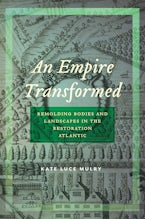Examines the efforts to bring political order to the English empire through projects of environmental improvement
When Charles II ascended the English throne in 1660 after two decades of civil war, he was confronted with domestic disarray and a sprawling empire in chaos. His government sought to assert control and affirm the King’s sovereignty by touting his stewardship of both England’s land and the improvement of his subjects’ health. By initiating ambitious projects of environmental engineering, including fen and marshland drainage, forest rehabilitation, urban reconstruction, and garden transplantation schemes, agents of the English Restoration government aimed to transform both places and people in service of establishing order. Merchants, colonial officials, and members of the Royal Society encouraged royal intervention in places deemed unhealthy, unproductive, or poorly managed. Their multiple schemes reflected an enduring belief in the complex relationships between the health of individual bodies, personal and communal character, and the landscapes they inhabited.
In this deeply researched work, Kate Mulry highlights a period of innovation during which officials reassessed the purpose of colonies, weighed their benefits and drawbacks, and engineered and instituted a range of activities in relation to subjects’ bodies and material environments. These wide-ranging actions offer insights about how restoration officials envisioned authority within a changing English empire.
An Empire Transformed is an interdisciplinary work addressing a series of interlocking issues concerning ideas about the environment, governance, and public health in the early modern English Atlantic empire.

